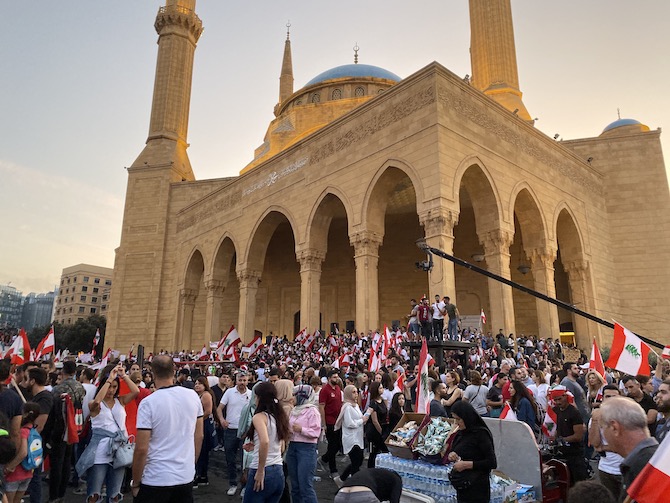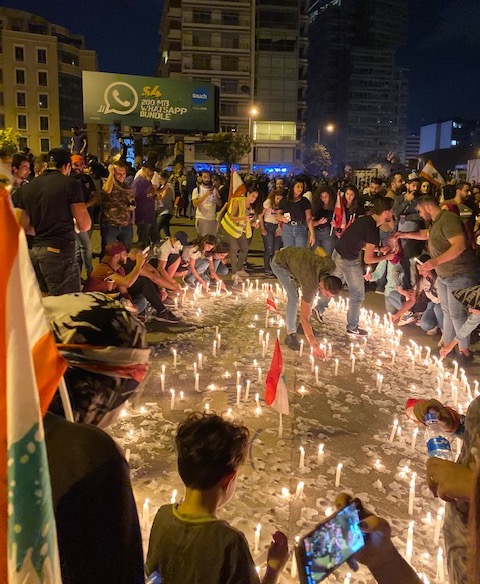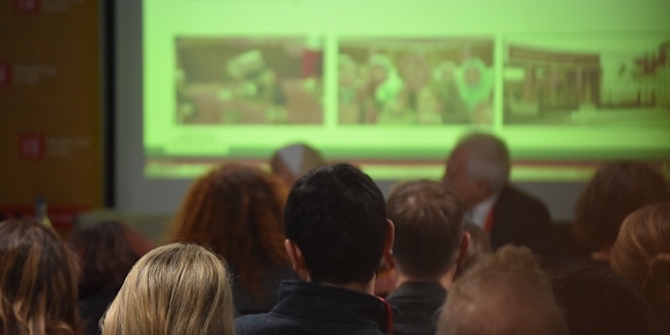by Menaal Munshey

Day 7 of protests in Lebanon: I spent twelve hours in Martyrs’ Square with friends from Dahiye. We were a large group – Jawad, his wife and son, other friends, and their parents. The youngest member of our group, all of 18 months old, slept through the DJs, renditions of ‘Baby Shark’, and contagious chants of hella hella ho… He grew up in Hay Sillom after all, Jawad said, one of Beirut’s most chaotic neighbourhoods. Hay Sillom is also where I learnt many of my lessons about the Lebanese economy and those it crushes: men who set themselves on fire because they can’t provide for their families, university students stuck in odd jobs trying to pay the bills, masters graduates receiving salaries out of tune with the cost of living, skilled workers unable to make the living they deserve in an economy that fails to function adequately. Electricity comes and goes regularly and randomly, private generator owners exploit neighbourhoods with unfair pricing, and people lost trust in their State many years ago. It’s hard not to. The Lebanese state doesn’t pay its fire fighters or first responders a salary, or pay the bills to keep its emergency equipment running. As the recent wildfires, currency crisis, and attempted taxation demonstrated, it’s a system that manages to take every last lira from the citizen, without considering the provision of basic services in return.
Behind the veneer of the memes, humour and music of these protests, are truly the happiest most depressed people in the world (as a placard stated) and simply people that are constantly trying to catch a break. In the third most indebted country in the world, the rich live in properties worth millions of dollars. In contrast, most Lebanese people are burdened with overwhelming debt, struggling to make payments on their apartment, their car, even the loan they took to get married. In a banking system that works like a pyramid scheme, people have been pressurised to the extent that they have been pushed to cross sectarian boundaries, class divides, and pre-conceived notions to come together for 5 days (so far) of protests that have changed this country already. The protests seen today in Lebanon are unanticipated and unprecedented in their scale, with shows of support coming from regular, mostly young, people: small business owners, blue-collar professionals, teachers, students, men, and women. While previous protests in 2005 and 2015 were significant in other ways, this feels like a precious moment in history, with a spirit like no other.
Syed Hasan Nasrallah (Secretary General of Hezbollah) has acknowledged the power of the protests, as has Prime Minister Saad Hariri, who recognised the movement’s demands for dignity. However, Nasrallah initially appeared to fully back the government. This was a gross miscalculation, and reflects the inability of Hezbollah, the Amal Movement, and other political leadership to understand the extent of anger that is directed towards political players, regardless of sectarian affiliations. People are hungry, and instead of begging for morsels, have decided that in fact they deserve to be fed – even if it requires taking their rights from the clenched fists of corrupt politicians. Looting parking meters for 500 Lebanese Pounds (0.3 USD) is a manifestation of this desperation.
Nasrallah’s initial statement divided opinions, pitting households against each other with husband and wife on opposing sides, father and son arguing over attending the protests, and cousins debating Nabih Berri’s legacy. Many protesters can’t remember a time when Berri wasn’t Speaker – he’s been in power for 27 years, and along with his wife, has engaged in multiple forms of corruption in Tyre. Between them and others in the ruling establishment, the coastline of Lebanon has been privatised. In a country with 220 km of coastline, it’s hard to think of a clean, accessible, public beach. The sea, the most beloved and public of goods, has been held hostage by a greedy, shortsighted political elite. Downtown Beirut tells a similar story: it is a display of the institutionalised theft that Solidere represents, and is now being reclaimed by citizens who have waited too long to be let in to the beloved Egg, or the Grand Theatre. Public space has finally been claimed by a population that is hungry, unemployed, angry, and confused.
The state itself seems to be caught by surprise, and unsure how many concessions to give the protestors. While Saad Hariri offered a package of reforms today, he omitted progressive taxation – unwilling to hit the rich (of which he is a part) where it hurts. Hariri lacks the political backbone to effect real change and suffers from a crisis of legitimacy with a recently revealed scandal (although it occurred in 2013) when he spent $16 million to cover up an affair in Seychelles. The reforms package has some merits, however, most protestors dismiss it as too little too late. It’s time for the country to be run a different way, without sectarianism and with accountability.
In a significant move, the Lebanese Judges Association has emerged as an independent player with a set of demands directed towards holding the ruling class accountable. They have called for thorough investigations, freezing of politician’s accounts, and removing banking secrecy provisions. The judiciary is on the people’s side. With significant state institutions turning on politicians in power, and 1.5 million people having descended on the streets across Lebanon, the tide certainly feels like it is turning.
The army initially came down hard on the protesters, after which there was a short period of neutrality, before reverting back to perpetrating state violence. Even in instances of state violence, there are moments of sympathy shared between the army and protestors. Afterall, they are part of the population of have-not’s in this country that the protestors are fighting for. It remains to be seen which path the armed forces take, and they will be remembered accordingly.

The movement’s mood is excited, jubilant, desperate and confused. There is no leadership and there are no central demands – that is the beauty of this revolution, and may also be its downfall. Central demands can be divisive, especially when it comes to the question of Hezbollah giving up weapons, and centralised leadership is prone to becoming the subject of attack and conspiracy theories. The end to sectarianism and the beginning of accountability have emerged as two central demands, amid a collective desire to tear the system down and let it burn.
There are no rules in a revolution. This revolution is fiercely female – with women forming a human wall between protesters and security forces, a brave woman kicking an armed man to force him away from protestors, and women playing their part in the visual and oral narrative on the streets. I have not felt uncomfortable in my skin, as a woman, for even a moment during the protests – and that’s difficult on a regular day, anywhere! This revolution has beats on repeat, impromptu dabke, laser installations reading #revolution and constant shisha smoking. It’s BYOB, it’s family friendly, and it’s singing nursery rhymes to our young ones at 1am in front of the Grand Serail, while palpably feeling the anger, hunger and humiliation that many people in this country face every day. But this is not every day in Lebanon. These are the days for Lebanese humour, Lebanese hope, and a united pathway to find justice for all of Lebanon.

Menaal Munshey is a PhD candidate in Criminology at the University of Cambridge, where her research focusses on gender-based violence in Lebanon. She teaches Syrian and Palestinian high-school students at the Unite Lebanon Youth Project, and has previously been a visiting scholar at the American University of Beirut and Lebanese American University. She is also a lawyer, and has been a policy research consultant at various United Nations agencies in Beirut, Vienna, Barcelona and Tokyo. She tweets @MenaalM







Musical revolution in techno too!
https://soundcloud.com/baytee_baytak/sounds-like-kiss-emmon